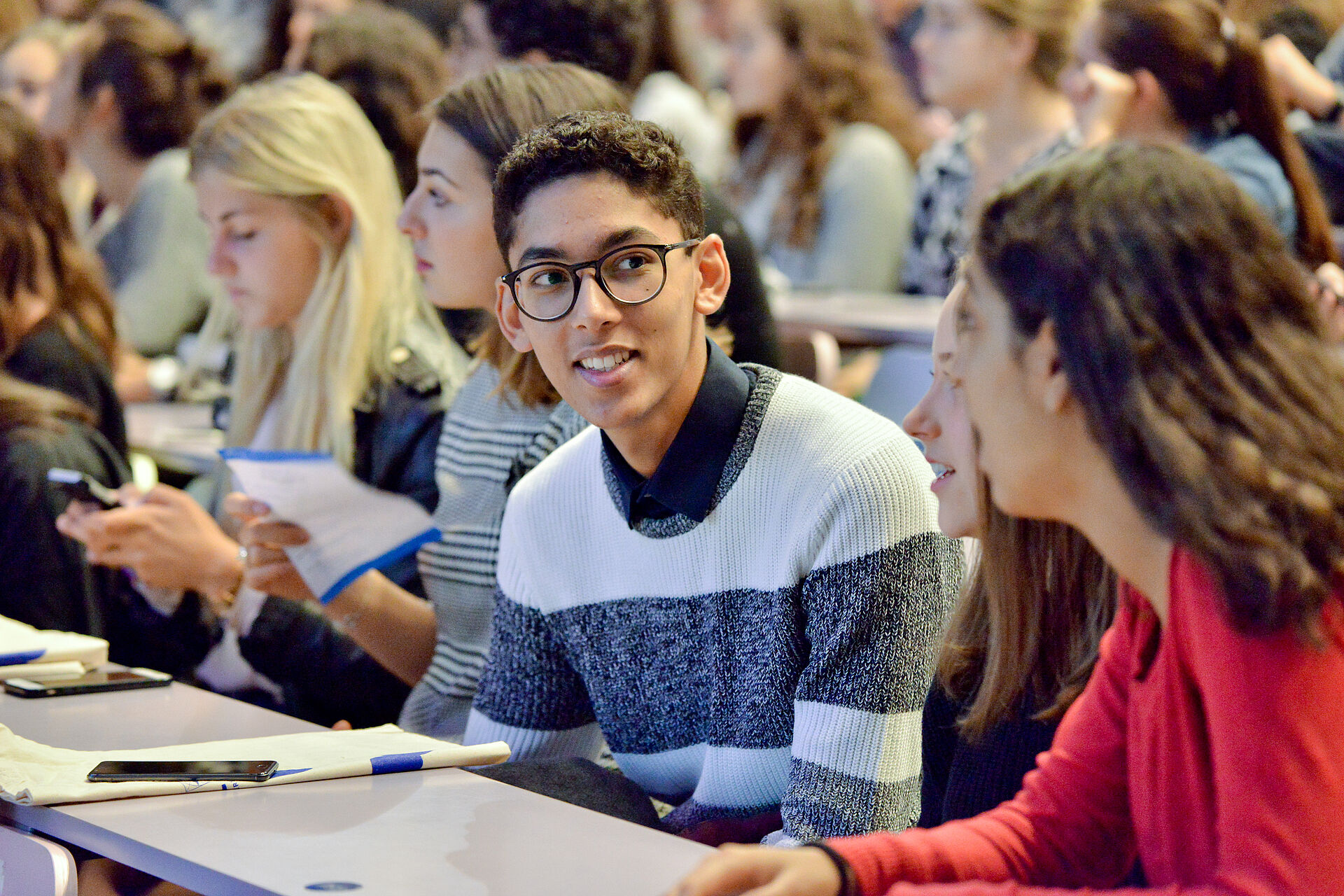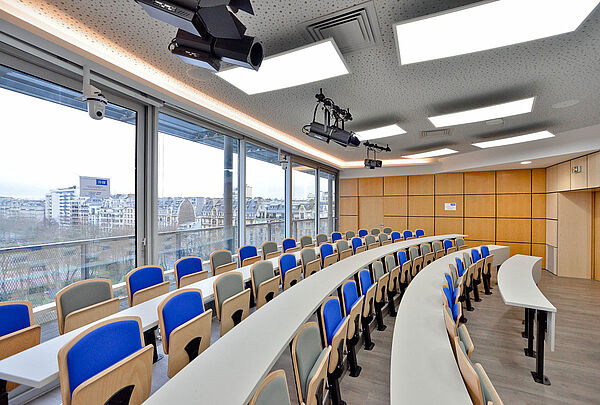Syllabus
Obligatoire (classique et international)
- Gouvernance et audit des données
Gouvernance et audit des données
Ects : 9
Lecturer :
Total hours : 54
Overview :
Le bloc "Gouvernance et Audit des Données" couvre plusieurs compétences clés liées à la gestion stratégique des données, la conformité réglementaire et l’audit des systèmes d’information
Coefficient : 1
Learning outcomes :
- tablir des règles de gestion du cycle de vie des données (création, stockage, exploitation, archivage, suppression).
- Assurer la qualité, la fiabilité et l’intégrité des données dans les systèmes d’information.
- Mettre en place un cadre éthique et stratégique pour l’exploitation des données.
- Développer une méthodologie d’audit des données pour évaluer la conformité et la performance des systèmes d’information.
- Soft Skills/Compétences complémentaires
Soft Skills/Compétences complémentaires
- Les principes de base de l'audit et du conseil
Les principes de base de l'audit et du conseil
Ects : 9
Lecturer :
Total hours : 96
Overview :
Le bloc "Principes de base de l’audit et du conseil" vise à développer des compétences clés dans l’analyse, l’évaluation et l’accompagnement des entreprises dans l’amélioration de leurs systèmes d’information et processus stratégiques
Coefficient : 1
Learning outcomes :
- comprendre les principes et objectifs de l’audit des systèmes d’information.
- Connaître les différentes typologies d’audit (audit financier, opérationnel, de conformité, de performance, SI).
- Appliquer les normes et référentiels en audit (COBIT, ITIL, ISO 27001, ISO 19011).
- Identifier les risques liés aux systèmes d’information et aux processus métier
- Sécurité, risques, menaces et recommandations
Sécurité, risques, menaces et recommandations
Ects : 9
Lecturer :
- JEROME BECK
Total hours : 42
Overview :
Notions clés et principaux processus opérationnels : sécurité organisationnelle sécurité logique, sécurité physique, sécurité réseau, etc./ Panorama des normes et des méthodes (ISO2700X)/ Hostilité de l'environnement et audit cruciaux/ Manipulation sociale et psychologique
Coefficient : 1
Learning outcomes :
Maîtrise du contexte législatif et réglementaire (CNIL, RGPD, NIST, etc.)/ Initiation aux outils utilisés par les hackers et les organisations/ Sensibilisation aux techniques d'attaque ciblant l'humain, ingéniérie sociale et manipulation/Spécificités et restitutions d'audits de la sécurité
- Travaux de groupes
Travaux de groupes
Total hours : 7.5
Obligatoire (classique et international)
- Les principes de bases de l'audit et du conseil
Les principes de bases de l'audit et du conseil
Ects : 3
Total hours : 9
Coefficient : 1
- Gouvernance et audit des données
Gouvernance et audit des données
Ects : 9
Lecturer :
Total hours : 127
Overview :
comprendre, structurer et contrôler la gestion des données dans les organisations.
Coefficient : 1
Learning outcomes :
- Définir des politiques de gestion des données (qualité, accessibilité, conformité, sécurité).
- Mettre en place un modèle de gouvernance des données basé sur des rôles et responsabilités (Data Owners, Data Stewards, DPO).
- Mettre en place des indicateurs de qualité des données et des dispositifs de surveillance.
- Analyser et évaluer la conformité réglementaire et les impacts sur l’organisation.
- Élaborer des rapports d’audit et des recommandations en lien avec les exigences de sécurité et d’intégrité des données.
- Appliquer des méthodologies d’audit (COBIT, ISO 19011, frameworks de cybersécurité)
- Pratique professionnelle /Mission en entreprise
Pratique professionnelle /Mission en entreprise
Ects : 3
Lecturer :
- GINA GULLA MENEZ
Overview :
Évaluation par l'entreprise des missions réalisées en apprentissage
Coefficient : 1
Learning outcomes :
Pratique du métier d'auditeur et/ou de consultant en système d'information
- Document/Soutenance
Document/Soutenance
Ects : 6
Lecturer :
- GINA GULLA MENEZ
Overview :
Rédaction d'un mémoire, travail de fin d'études autour d'un sujet émergent dans le domaine de l'audit et/ou du conseil des systèmes d'information. Soutenance devant le jury.
Coefficient : 1
Learning outcomes :
Prise de hauteur par rapport à un sujet de recherche/ Problématisation/Savoir réaliser un état de l'art référencé
Assessment :
Evaluation du mémoire et soutenance.
- Soft Skills/Compétences complémentaires
Soft Skills/Compétences complémentaires
- Sécurité, risques, menaces et recommandations
Sécurité, risques, menaces et recommandations
Ects : 3
Lecturer :
- ROLAND INAN
Total hours : 39
Coefficient : 1
- Voyage d'études
Voyage d'études
- Projets tutorés/Travaux de groupes
Projets tutorés/Travaux de groupes
Academic Training Year 2025 - 2026 - subject to modification
Teaching Modalities
The program consists of around 400 hours of instruction, spread out between September and September. Several courses are taught in English.
Courses fit into one of five key categories:
- Core theoretical courses,
- Professionalization courses tailored to the position of auditor of information systems
- Practical applications (based on case studies)
- Critical, reflexive approach to different practices from an interdisciplinary perspective
- Company assignments
For students pursuing an apprenticeship, the year is structured on a rotational model, according to the following schedule:
- September: courses on campus
- October to December: three days at the workplace; two days on campus
- January to March: full-time in the workplace
- From April to May: three days at the workplace; two days on campus
- July to September: full-time at the workplace
Internships and Supervised Projects
At the end of the year, students produce and defend a thesis.
Students in the SIEE Master's program are expected to demonstrate their commitment through professional projects called “Projects of Commitment to the Master's program”
These are required for all members of the Master's cohort. For example:
- Strengthen the alumni network: organize an alumni event
- Convert the paper-based alumni directory into an app
- Create a digital identity for the program / improve digital communication
- MACSI - Dauphine Junior Consulting
- Launch a marketing campaign
- Organize an “IA Auditing” conference
- Strengthen ties with the Dauphine campus in Tunis
- International Awareness
Increasing international awareness is a key element of the curriculum and is facilitated in partnership with a university with an equivalent Master's program. It takes the form of theoretical courses and case studies that students research before presenting a report in English. The themes change from year to year but are always connected to course content and emerging technologies.
Research-driven Programs
Training courses are developed in close collaboration with Dauphine's world-class research programs, which ensure high standards and innovation.
Research is organized around 6 disciplines all centered on the sciences of organizations and decision making.
Learn more about research at Dauphine


